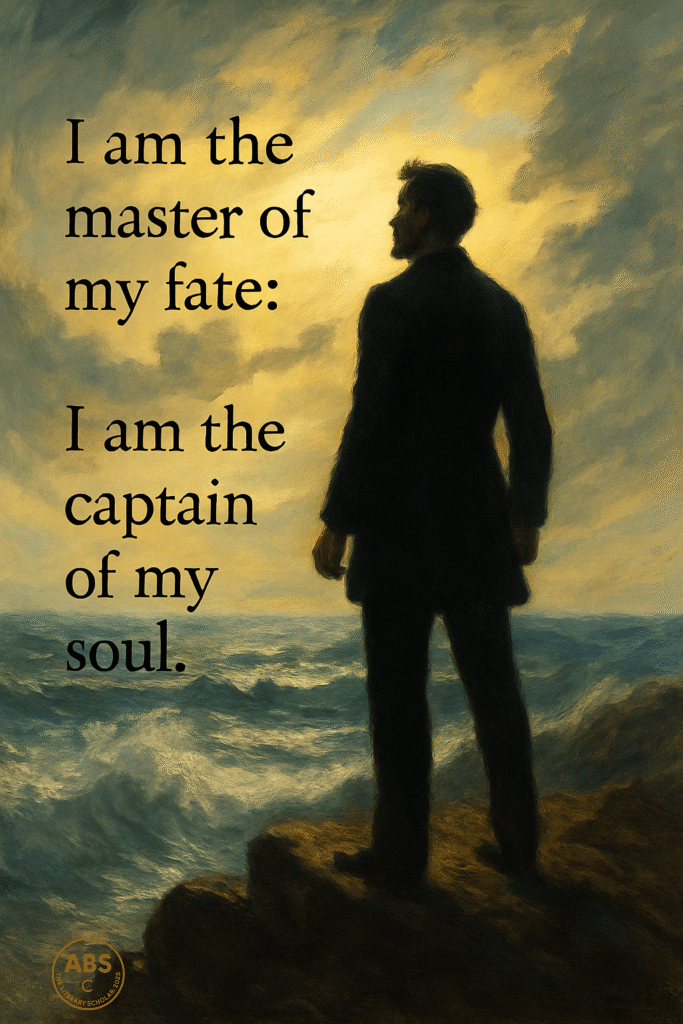A Poem Where Pain Bows, Darkness Waits, and the Poet’s Spine Doesn’t Flinch
ABS Believes:
Some poems wear armor. This one is the armor.
If dignity had a literary anthem, it would rhyme like this and walk like thunder.
Henley: Poet, Amputee, and Unshakable Human Tank
William Ernest Henley didn’t write Invictus to impress the Victorian literati. He wrote it while lying in a hospital bed, with one leg already amputated and the other threatening to join the party. And yet—he didn’t weep. He didn’t whine. He crafted a declaration of defiance that’s been echoing through locker rooms, prisons, boardrooms, and battlefields ever since.
Invictus isn’t a poem. It’s a survival mindset in stanzas.
Stanza One: Straight Out of the Shadow
“Out of the night that covers me,
Black as the Pit from pole to pole…”
No subtle metaphors here. The guy is in pitch-black despair. Full coverage. No daylight. Possibly sponsored by existential crisis.
“I thank whatever gods may be
For my unconquerable soul.”
He doesn’t name the gods—just throws a polite thanks into the void. But he’s not crediting divine intervention. He’s crediting his soul—like a man who’s been through ten rounds of life and still owns the ring.
Stanza Two: Bruised, Not Broken
“In the fell clutch of circumstance
I have not winced nor cried aloud.”
“Fell clutch” = a Victorian way of saying “life put me in a chokehold.”
And his response? No wincing. No dramatic exits. Just unspoken fury in formal syntax.
“Under the bludgeonings of chance
My head is bloody, but unbowed.”
This line deserves a trophy.
Modern version: “Yes, life punched me in the face. No, I didn’t kneel. Next question.”
This is the line people tattoo on their ribs when they survive something that should’ve wrecked them.
Stanza Three: Fear and Fate—Both Denied Entry
“Beyond this place of wrath and tears
Looms but the Horror of the shade…”
Henley’s version of the afterlife isn’t fluffy clouds. It’s horror. But does he panic? Of course not. He acknowledges the horror like it’s an annoying neighbor.
“And yet the menace of the years
Finds, and shall find me, unafraid.”
Time can come for him with knives and shadows and overdue bills—he’ll still sit there, unmoved, like a poetic bouncer at the club of mortality.
Stanza Four: The Line Everyone Quotes on T-Shirts
“It matters not how strait the gate,
How charged with punishments the scroll…”
He’s referencing religion here—maybe alluding to judgment day. Tight gates, long scrolls of sins, divine consequences.
“I am the master of my fate:
I am the captain of my soul.”
There it is.
The line that launched 10,000 motivational posters, political speeches, and midlife tattoo decisions.
This isn’t spiritual arrogance. It’s poetic self-possession. Henley’s body may have been in pieces—but his voice never fractured.
Modern Echoes & ABS Commentary
“Black as the Pit from pole to pole…”
Translation: My mental weather forecast is apocalypse with a 100% chance of existential drizzle.
“Bloody, but unbowed…”
What every exhausted adult says at 9 PM with a face full of under-eye cream and pride.
“Finds me unafraid…”
Even the IRS wouldn’t scare this man.
“Captain of my soul…”
He doesn’t need a life coach. He is the life coach—of his own spirit.
Why This Poem Still Commands Attention in Quiet Rooms
Because it never asks for pity.
Because it walks alone—and walks tall.
Because it tells you that suffering is real, but submission is optional.
And because we all need a voice like Henley’s when our bones ache and the world shrinks.
The Literary Scholar folds the scroll like a banner carried through storms, its ink defiant and its pulse still loud beneath the paper.

Signed,
The Literary Scholar
Where resilience rhymes, and dignity wears scuffed boots
Where the soul stands tall even when the body kneels
Share this post / Spread the witty word / Let the echo wander / Bookmark the brilliance
